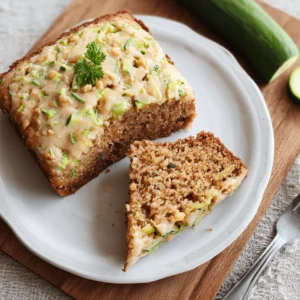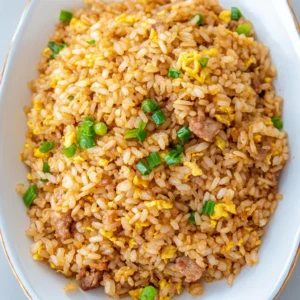You don’t need a flashy teppanyaki chef or a smoking-hot griddle show to enjoy authentic hibachi fried rice. With a few smart techniques, simple ingredients, and a little prep, you can recreate that iconic Japanese steakhouse flavor right in your home kitchen—no juggling spatulas required.
This dish is more than just rice tossed in a hot pan. Hibachi fried rice is about balance: crispy grains, buttery undertones, and the smoky aroma of sesame and soy mingling with eggs, vegetables, and proteins. In this guide, I’ll walk you through how to make it better than takeout—and certainly better than the bland restaurant versions that miss the mark.
Let’s get into what makes this recipe stand out.
What is Hibachi Fried Rice
Hibachi fried rice is a Japanese-American fusion dish made on a hot flat grill, known as a teppan. It’s cooked with high heat and quick stirring, resulting in flavorful, slightly crispy rice blended with butter, soy sauce, eggs, and often vegetables or proteins.
How It Differs from Regular Fried Rice
Here’s how hibachi fried rice differs from its Chinese counterpart:
Definition List:
Cooking surface
Hibachi rice is traditionally cooked on a teppanyaki flat-top grill; Chinese fried rice is made in a wok.
Rice type
Hibachi uses short- or medium-grain rice like Calrose or jasmine; Chinese fried rice typically uses long-grain rice like basmati.
Flavor profile
Hibachi fried rice is buttery with toasted sesame oil and mild soy flavors; Chinese versions often include oyster sauce, scallions, and more intense aromatics.
Texture
Hibachi rice often has a slight crisp from the hot plate; Chinese fried rice tends to be softer with less searing.
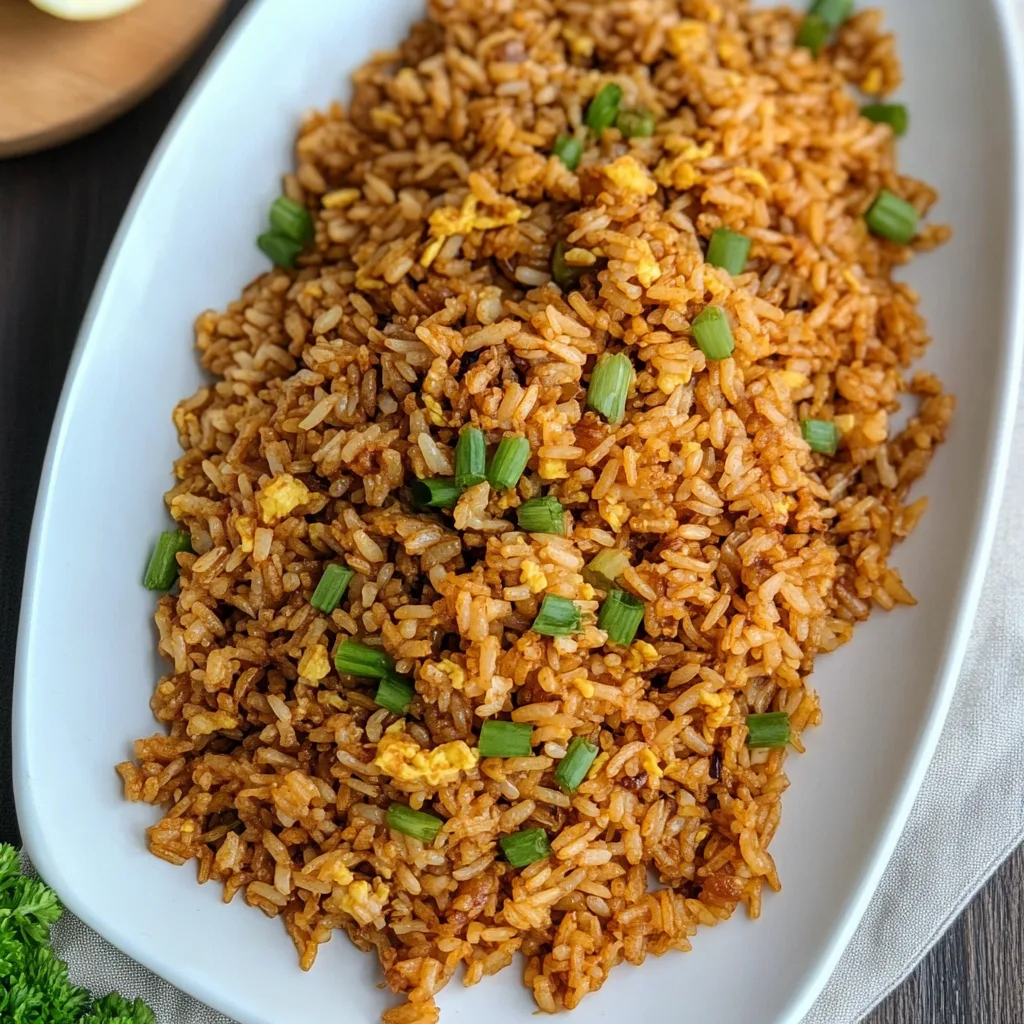
Why You Should Use Day-Old Rice
This is a step many people skip—and the result is mushy rice. Using rice that’s had time to dry out in the fridge creates individual grains that hold up under high heat and absorb flavors more effectively.
But what if you forgot to make it ahead? Here’s a quick fix:
How to Dry Freshly Cooked Rice Fast:
-
Spread it on a baking sheet
-
Cool it uncovered in the fridge for 30–60 minutes
-
Fluff occasionally to release steam
It’s not perfect, but it works in a pinch.
Ingredients You’ll Need
Unlike many restaurant-style versions, this recipe doesn’t overload you with unnecessary ingredients. You’ll only need a handful, but each plays a role in building that signature hibachi flavor.
Ingredient Table:
| Ingredient | Purpose | Notes |
|---|---|---|
| Cooked Rice (3 cups) | Base of the dish | Day-old works best (Calrose, Jasmine, or brown rice) |
| Eggs (2 large) | Protein and texture | Lightly beaten before scrambling |
| Onion (½ cup, chopped) | Aroma and flavor base | Yellow or white |
| Garlic (1 clove, minced) | Extra depth and umami | Optional, but recommended |
| Soy Sauce (2 tbsp) | Saltiness and umami | Low sodium preferred |
| Butter (1 tbsp) | Rich flavor and browning agent | Unsalted for better control |
| Neutral Oil (1 tbsp) | High-heat cooking | Grapeseed, canola, or avocado |
| Toasted Sesame Oil (1 tsp) | Smoky nutty finish | Only added at the end |
| Scallions (for garnish) | Freshness and color | Thinly sliced just before serving |
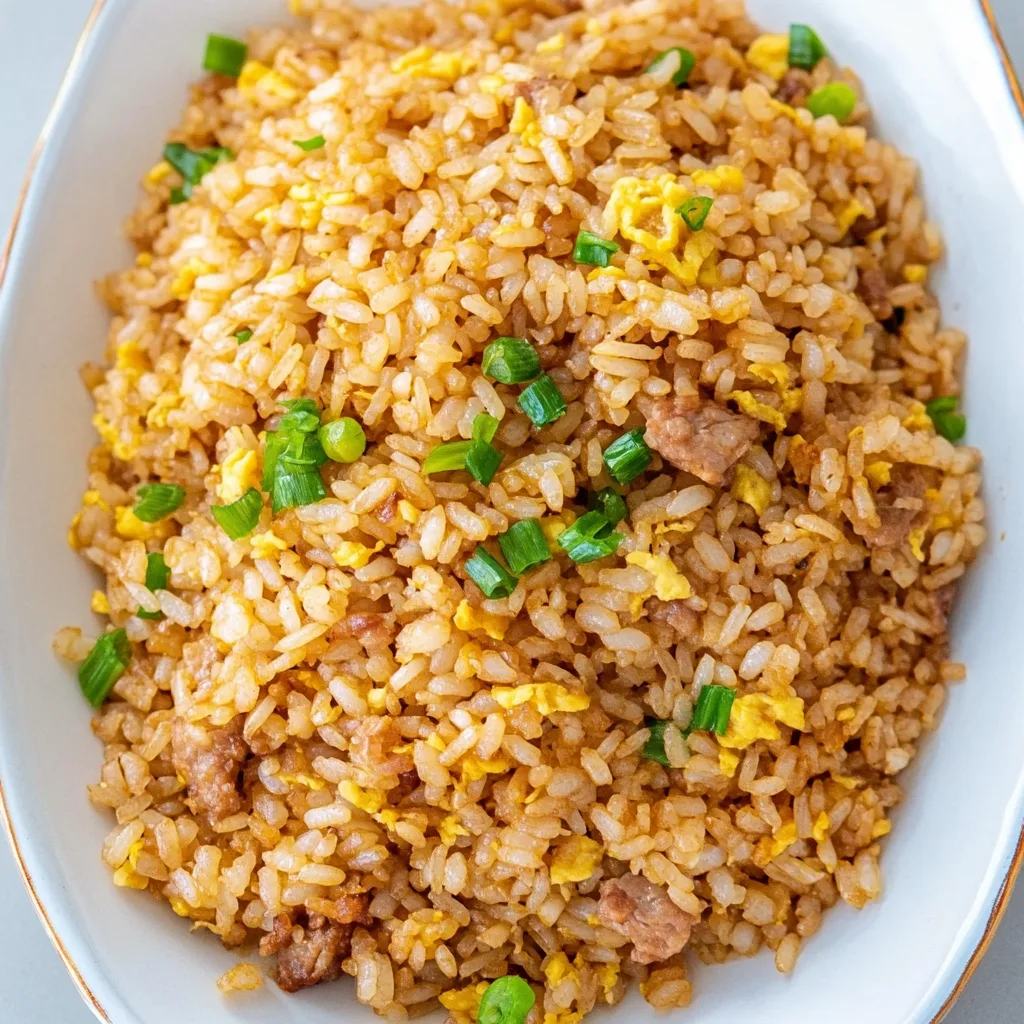
Ingredients that Bring Hibachi Fried Rice to Life
Every spoonful of hibachi fried rice should feel like a perfect bite from your favorite Japanese steakhouse. To get that signature flavor and texture at home, each ingredient plays a special role. Let’s take a closer look at them.
Definition List of Key Ingredients
Day-old cooked rice
Pre-cooked and refrigerated rice helps achieve the perfect fried texture without turning mushy.
Butter and high-smoke-point oil
Butter adds richness, while oil like avocado or grapeseed keeps things crisp without burning.
Eggs
Adds protein, texture, and color. Scrambled separately for even distribution.
Onions
Brings depth and slight sweetness. Yellow or white onions work best.
Ginger
Freshly grated ginger adds warmth and an earthy aroma.
Soy sauce
Low-sodium soy sauce balances salt and umami without overpowering.
Toasted sesame oil
Just a splash delivers that authentic smoky hibachi flavor.
Scallions
Used at the end for garnish and a fresh crunch.
Optional Add-ins for Custom Flavor
Want to make it your own? Try these additions to elevate your fried rice game:
● Frozen peas or carrots for color and sweetness
● Cooked shrimp, chicken, steak, or tofu for protein
● Garlic or garlic powder for extra aroma
● A splash of rice vinegar for brightness
● Chili oil or sriracha for heat lovers
These additions aren’t traditional, but they’re loved in many home kitchens for a reason.
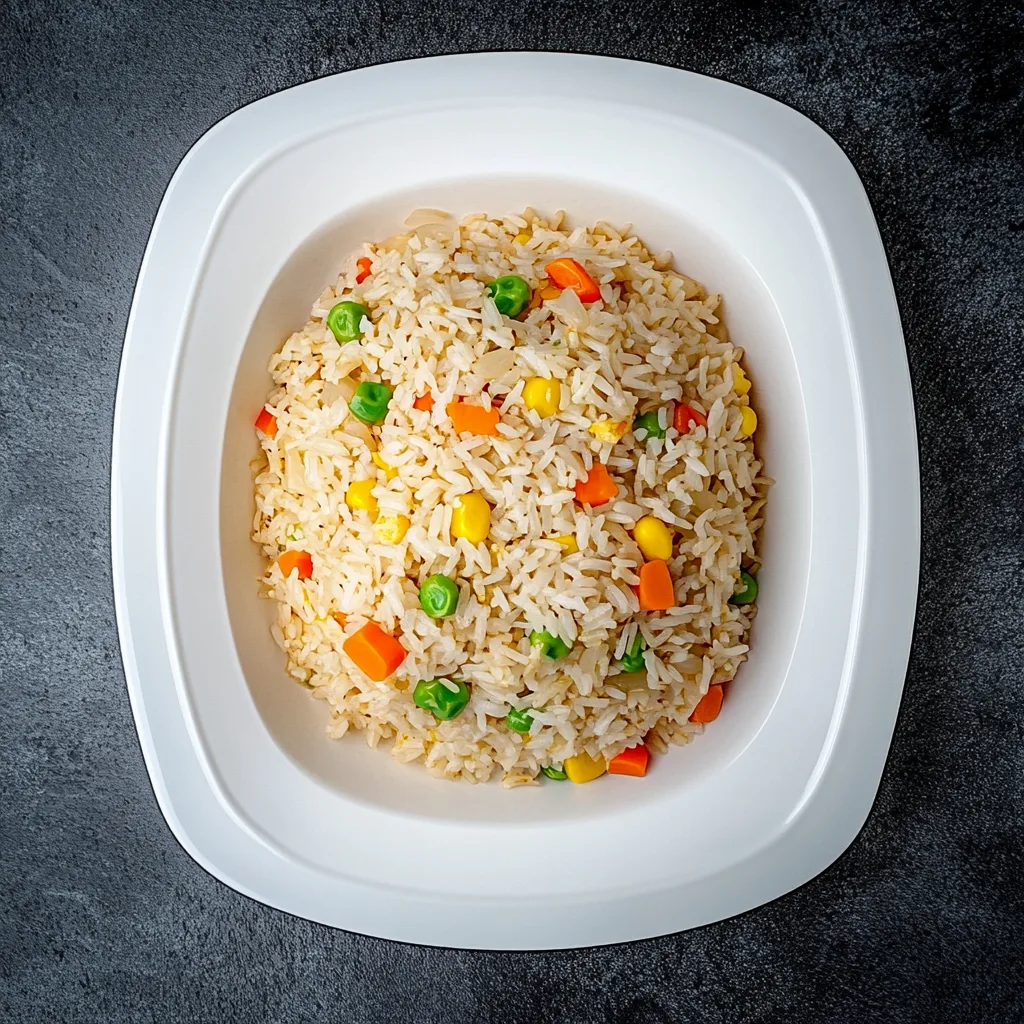
Step-by-Step Guide to Perfect Hibachi Fried Rice
1. Prepare the Rice
If you didn’t prep rice a day before, don’t worry. Spread fresh rice on a tray and cool it in the fridge for 30–60 minutes uncovered. It’s a quick way to replicate the dry texture you need for frying.
2. Cook the Eggs
Heat your pan over high heat. Add a teaspoon of oil and pour in lightly beaten eggs. Stir quickly to scramble and cook. Set them aside once fluffy and firm.
3. Sauté Aromatics
Add butter to the hot skillet and toss in chopped onions. Sauté until soft but not browned. Stir in the grated ginger and cook for about 30 seconds. This brings out mellow, fragrant flavors without overpowering the dish.
4. Add the Rice
Now comes the transformation. Add your cold rice to the pan. Flatten it out with a spatula and let it sit undisturbed for about 30 seconds. This is where the signature sizzle happens. Stir, flatten again, and repeat 2–3 times. This technique creates crispy, caramelized bits.
5. Season and Finish
Add scrambled eggs back in. Drizzle soy sauce and sesame oil over the top. Toss everything together until the rice is evenly coated and fragrant. Garnish with sliced scallions and serve immediately.
Hibachi Fried Rice Troubleshooting Tips
Even a simple recipe like this can go sideways if you’re not careful. Here’s how to avoid common mistakes:
● Rice too wet or sticky? Use day-old rice or cool freshly made rice properly.
● Pan too crowded? Cook in batches if needed to prevent steaming.
● Eggs overcooked? Scramble them separately and add them at the end.
● Rice flavor falling flat? Don’t skip toasted sesame oil—it makes a difference.
● Rice sticking? Use a nonstick skillet or enough oil, and keep your pan hot.
These adjustments can turn average homemade fried rice into a restaurant-style masterpiece.
Best Cooking Tools for Fried Rice
Choosing the right equipment makes a big difference in flavor and texture.
| Tool | Why It’s Great for Fried Rice | Recommended Alternatives |
|---|---|---|
| Griddle | Provides even high heat and a large cooking area | Flat electric griddle |
| Wok | Traditional option for quick stir-frying | Deep stainless-steel skillet |
| Cast iron pan | Holds heat well and gives a slightly charred finish | Dutch oven or heavy-bottom pan |
| Silicone spatula | Prevents sticking and great for scraping rice bits | Wooden spoon |
Serving Ideas and Pairings That Complete the Meal
Hibachi fried rice may be a standout dish, but pairing it with the right sides and proteins turns dinner into an unforgettable meal. Here are some restaurant-style combos you can recreate at home.
Best Proteins to Pair With Hibachi Fried Rice
● Garlic butter steak cubes or hibachi-style sirloin
● Grilled teriyaki chicken or miso-glazed salmon
● Sautéed shrimp with lemon and soy
● Tofu seared in sesame oil for a plant-based twist
Classic Sides You’ll Love
● Stir-fried zucchini and mushrooms
● Steamed broccoli with sesame seeds
● Cucumber salad with rice vinegar
● Yum Yum sauce or ginger sauce on the side
These additions round out the meal and complement the umami-rich rice beautifully.
Variations of Hibachi Fried Rice Worth Trying
Want to mix things up? These versions offer new flavors while keeping that iconic fried rice base.
Creative Twists
● Kimchi Fried Rice – Add chopped kimchi and gochujang for a Korean spin.
● Pineapple Fried Rice – Add chunks of fresh pineapple for a tropical flair.
● Spicy Garlic Fried Rice – Use chili flakes and fresh garlic to bring the heat.
● Cauliflower Fried Rice – Substitute rice with riced cauliflower for a low-carb version.
These alternatives let you enjoy hibachi-style comfort food with a new flavor profile.
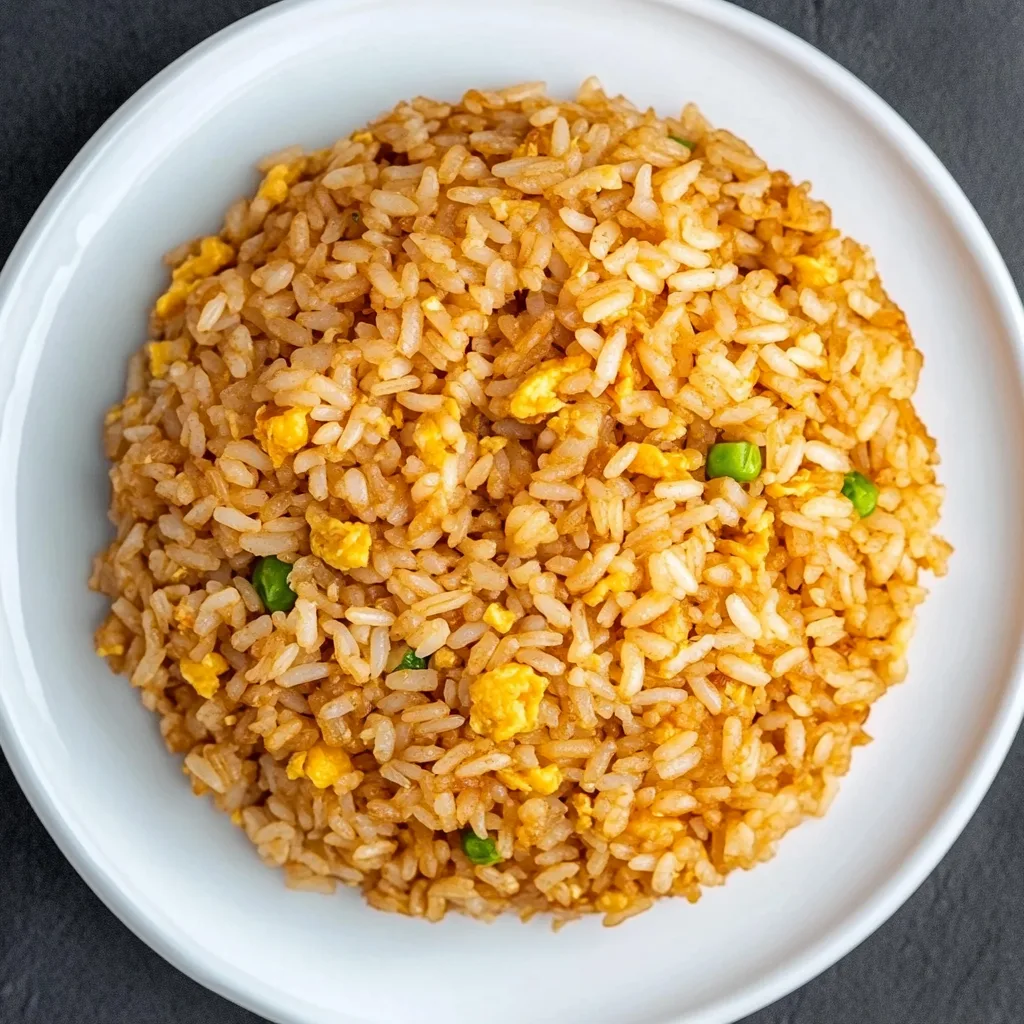
FAQ About Hibachi Fried Rice
What’s the best rice for hibachi fried rice?
Calrose or jasmine rice works best. It holds shape, absorbs flavor, and crisps well when cold.
Can I make this without a wok or griddle?
Yes! A large skillet or cast iron pan works fine. Just ensure it’s hot and wide enough to avoid steaming.
How long does leftover hibachi fried rice last?
Stored in an airtight container, it will last 3–4 days in the fridge. Reheat in a skillet for best results.
Is hibachi fried rice gluten-free?
Only if you use gluten-free tamari instead of regular soy sauce. Always double-check labels.
Can I freeze hibachi fried rice?
Yes, let it cool completely before freezing in a sealed container. Reheat straight from frozen in a skillet.

Hibachi Fried Rice Recipes
Method
- Heat oil in a large skillet or wok over high heat. Scramble the eggs quickly and remove to a bowl.
- Add butter to the pan. Sauté chopped onions until soft, then stir in the ginger for 30 seconds.
- Add rice to the pan, flattening it to let it crisp. Stir, flatten again, and repeat.
- Return scrambled eggs to the skillet. Add soy sauce and sesame oil, stirring until fully incorporated.
- Serve warm with scallions on top and optional dipping sauce.
Notes
- Day-old rice is ideal for texture.
- Add veggies or protein as desired.
- Don’t skip toasted sesame oil for true hibachi flavor.
Nutritional Facts (Per Serving)
| Nutrient | Amount |
|---|---|
| Calories | 312 |
| Protein | 8g |
| Carbohydrates | 42g |
| Fat | 12g |
| Fiber | 2g |
| Sodium | 540mg |


